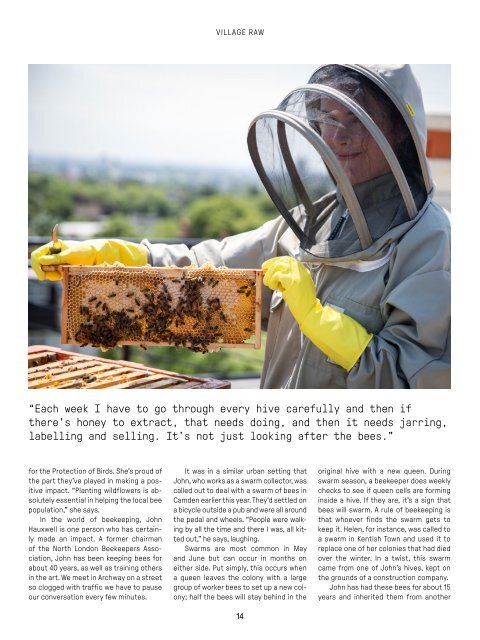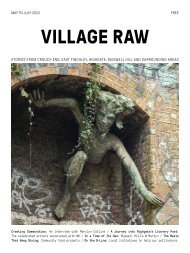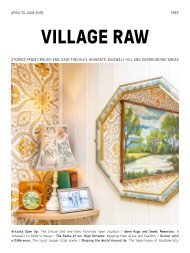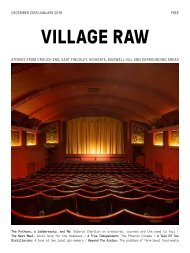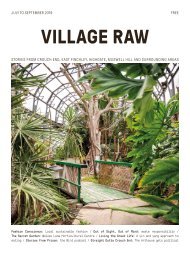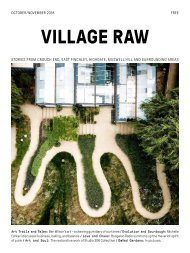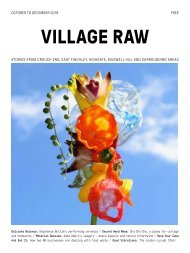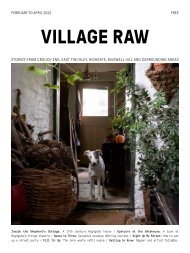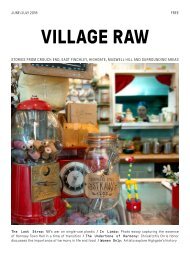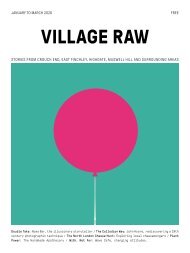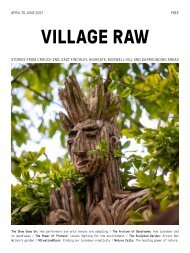Village Raw - ISSUE 2
Village Raw is a magazine that explores cultural stories from Crouch End, East Finchley, Highgate, Muswell Hill and the surrounding areas. The magazine is created by the community, for the community. If you like this issue you can support the project through a subscription or donation. See the links below. The second issue of Village Raw magazine includes: I, STORY - How story is an essential part of our daily lives. I KNOW WHERE MARK NEVIN LIVES - Interview with the Highgate musician. INHABITING OUR BODIES - Mina Aidoo discusses embodiment and how it affected her life. HOT BUZZ - Uncovering the hidden world of beekeeping. UPCYCLE RECYCLE - Reclaiming disused materials for a sustainable future. THE PEOPLE’S THEATRE - The restoration of the Alexandra Palace Theatre. THE VILLAGE WITHIN THE CITY - Building a community hub with Robby Sukhdeo. TENNIS AND GAZPACHO - Affordable and accessible cooking with chef James Taylor. CRAFT (T)ALE - The north London brew masters serving up the perfect pour. THE GENIUS IN EVERYONE - Everyone an artist and everyone a scientist at the Fun Palace. VILLAGE ESSAY - The Art of Witnessing by Laura Alvarado. AND MORE…
Village Raw is a magazine that explores cultural stories from Crouch End, East Finchley, Highgate, Muswell Hill and the surrounding areas. The magazine is created by the community, for the community. If you like this issue you can support the project through a subscription or donation. See the links below. The second issue of Village Raw magazine includes:
I, STORY - How story is an essential part of our daily lives.
I KNOW WHERE MARK NEVIN LIVES - Interview with the Highgate musician.
INHABITING OUR BODIES - Mina Aidoo discusses embodiment and how it affected her life.
HOT BUZZ - Uncovering the hidden world of beekeeping.
UPCYCLE RECYCLE - Reclaiming disused materials for a sustainable future.
THE PEOPLE’S THEATRE - The restoration of the Alexandra Palace Theatre.
THE VILLAGE WITHIN THE CITY - Building a community hub with Robby Sukhdeo.
TENNIS AND GAZPACHO - Affordable and accessible cooking with chef James Taylor.
CRAFT (T)ALE - The north London brew masters serving up the perfect pour.
THE GENIUS IN EVERYONE - Everyone an artist and everyone a scientist at the Fun Palace.
VILLAGE ESSAY - The Art of Witnessing by Laura Alvarado.
AND MORE…
Create successful ePaper yourself
Turn your PDF publications into a flip-book with our unique Google optimized e-Paper software.
VILLAGE RAW<br />
SUSTAINABLE VILLAGE<br />
beekeeper who fell ill. He’s been looking<br />
after them ever since and gives the office<br />
workers some of the honey produced<br />
every year. He also keeps bees at St<br />
Pancras and Islington Cemetery in East<br />
Finchley and adjacent to a home in Highgate,<br />
discreetly hidden behind a fence.<br />
It’s amazing to think that so many<br />
hives can be dotted around London, with<br />
people seemingly oblivious to their existence.<br />
But keeping bees is not as straightforward<br />
as it used to be. Varroa, a mite<br />
that weakens bees, was introduced to this<br />
country in 1992. “Beekeeping was simpler<br />
before varroa,” says John. The national average<br />
of losses is about 20% per year, he<br />
tells me, more during long winters.<br />
More recent threats include the Asian<br />
hornet, common in France but also in<br />
smaller numbers in the UK; and the small<br />
hive beetle, currently as close as Italy.<br />
Both can destroy honeybee colonies. Despite<br />
these challenges, there has been a<br />
surge of interest in beekeeping since John<br />
took it up. He doesn’t see this as a problem:<br />
“It’s really good that we are training<br />
more people to look after bees sensibly.”<br />
Training is advised for anyone who<br />
might want to keep bees, whether on<br />
roofs, allotments or gardens. Lucie Chaumeton,<br />
who lives in East Finchley, keeps<br />
some at the bottom of her garden and is<br />
still a novice. This is her third season of<br />
keeping bees after doing some training in<br />
Barnet, where there is a teaching apiary.<br />
“It’s therapeutic to be around them,” she<br />
says, adding that she finds the hobby intellectually<br />
stimulating.<br />
“It’s fascinating,” Helen agrees. “The<br />
more you look into it, the more obsessed<br />
you get.” And, of course, the payoff is<br />
the honey and a sociable network of local<br />
beekeepers. “I’ve never met a nasty<br />
beekeeper,” John says. His bees that<br />
swarmed this year, incidentally, are now<br />
thriving on Helen’s roof.•<br />
North London Beekeepers is running taster<br />
sessions on 15 September.<br />
Book via www.beekeeping.org.uk<br />
You can see more bee photos on our website:<br />
www.villageraw.com/bees<br />
WHAT YOU CAN DO:<br />
• Grow more flowers, shrubs<br />
and trees. Cyclamen and<br />
mahonia shrubs are good<br />
for winter months.<br />
• Plant window boxes.<br />
• Weed and cut grass less<br />
often; let your garden<br />
grow wild.<br />
• Keep a pot of moist moss<br />
outside that bees can use<br />
for hydration.<br />
• Ask your council to<br />
adopt a pollinator action<br />
plan. Friends of the Earth<br />
has a petition you can<br />
put your name to: www.<br />
friendsoftheearth.uk/bees<br />
“Each week I have to go through every hive carefully and then if<br />
there’s honey to extract, that needs doing, and then it needs jarring,<br />
labelling and selling. It’s not just looking after the bees.”<br />
HELP THE BEES<br />
MAKE YOUR OWN MEADOW<br />
for the Protection of Birds. She’s proud of<br />
the part they’ve played in making a positive<br />
impact. “Planting wildflowers is absolutely<br />
essential in helping the local bee<br />
population,” she says.<br />
In the world of beekeeping, John<br />
Hauxwell is one person who has certainly<br />
made an impact. A former chairman<br />
of the North London Beekeepers Association,<br />
John has been keeping bees for<br />
about 40 years, as well as training others<br />
in the art. We meet in Archway on a street<br />
so clogged with traffic we have to pause<br />
our conversation every few minutes.<br />
It was in a similar urban setting that<br />
John, who works as a swarm collector, was<br />
called out to deal with a swarm of bees in<br />
Camden earlier this year. They’d settled on<br />
a bicycle outside a pub and were all around<br />
the pedal and wheels. “People were walking<br />
by all the time and there I was, all kitted<br />
out,” he says, laughing.<br />
Swarms are most common in May<br />
and June but can occur in months on<br />
either side. Put simply, this occurs when<br />
a queen leaves the colony with a large<br />
group of worker bees to set up a new colony;<br />
half the bees will stay behind in the<br />
original hive with a new queen. During<br />
swarm season, a beekeeper does weekly<br />
checks to see if queen cells are forming<br />
inside a hive. If they are, it’s a sign that<br />
bees will swarm. A rule of beekeeping is<br />
that whoever finds the swarm gets to<br />
keep it. Helen, for instance, was called to<br />
a swarm in Kentish Town and used it to<br />
replace one of her colonies that had died<br />
over the winter. In a twist, this swarm<br />
came from one of John’s hives, kept on<br />
the grounds of a construction company.<br />
John has had these bees for about 15<br />
years and inherited them from another<br />
Win a Seedball Bee Mix<br />
tin and My Wildflower<br />
Mix bulk bag<br />
Post a photograph of <strong>Village</strong> <strong>Raw</strong><br />
magazine, open on any page of this<br />
bee feature, to social media with<br />
#savebees #villageraw and the<br />
winner will be selected at random.<br />
14 15


